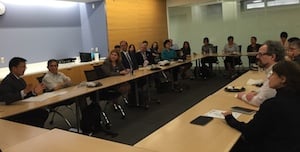 |
|
| China Mental Health Program Director Xiaoduo Fan, MD, leads a discussion during the UMass Medical School Global Mental Health: a Chinese Perspective |
Asian Americans, the fastest growing ethnic minority group in the United States, have the lowest utilization rate of mental health services across all ethnic populations. To better understand why, and explore what can be done to improve mental health care for Asians in the United States and abroad, the China Mental Health Program at UMass Medical School hosted its first symposium, “Global Mental Health: a Chinese Perspective.”
China Mental Health Program Director Xiaoduo Fan, MD, associate professor of psychiatry, was joined at the symposium by other UMMS faculty and collaborators from UMass Boston, UMass Amherst, Massachusetts General Hospital and Harvard University. They initiated the project with three purposes: to identify potential local and international partners in the fight against mental illness in the Chinese and Chinese-American populations; to create viable public health networks in central Massachusetts and in China to effectively treat those affected with mental illnesses; and to foster a collaborative research effort to ultimately discover the causes and treatments of mental illnesses.
The Aug. 26 symposium began with a showing of “Hidden Pictures,” a film by physician and filmmaker Delaney Ruston, MD, that explores the lives of people affected by mental illness around the world. The movie was followed with comments from speakers including UMMS faculty Douglas Ziedonis, MD, chair and professor of psychiatry; David Kennedy, PhD, professor of psychiatry; and Amy Wachholtz, PhD, assistant professor of psychiatry.
The focus was on the intersection of medicine, culture, and religion. Dr. Wachholtz addressed the bio-psycho-social-spiritual model of treating pain disorders. Dr. Ziedonis talked about the international collaboration “Addressing Tobacco Through Organizational Change” between UMMS, several other Massachusetts universities and China’s Sichuan University, Shanghai Jiaotong University and Tianjin Mental Health Center. Sun Kim, PhD, associate professor of nursing at UMass Boston, discussed the problem of widespread smoking among Chinese men, and addressed the social prestige attached to tobacco use as a driving cause of the epidemic. Albert Yeung, MD, associate professor of psychiatry at Harvard Medical School, discussed the cultural stigma attached to mental illness among Chinese people.
Other speakers examined mental health problems common amongst Asian-American youths; the bicultural socialization needs of children adopted from China; and intercultural stressors in Chinese immigrant students’ life and strategies for alleviating them.
“The symposium was a timely event bringing together people of similar goals and interests,” said Chieh Li, EdD, associate professor of applied psychology at Northeastern University.
Potential partnerships for upcoming projects were formed as attendees and participants exchanged contact information and discussed commonalities in their work. Symposium participant Anh Vu Sawyer, executive director of the Southeast Asian Coalition of Central Massachusetts, noted that the issues addressed resonated among refugees from Southeast Asia living in Worcester.